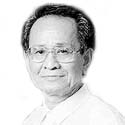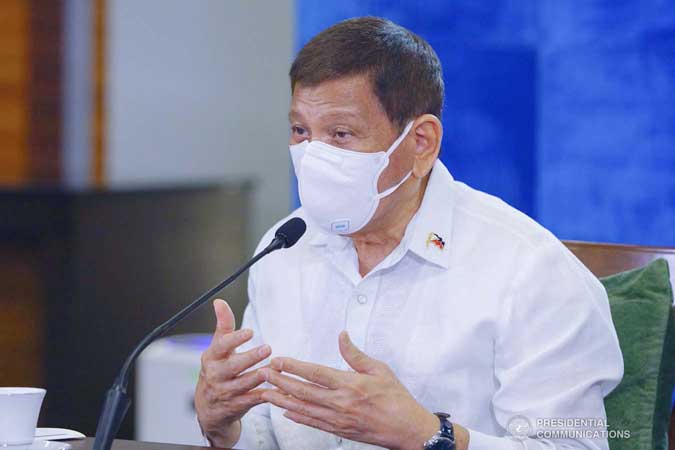
Vantage Point
By Luis V. Teodoro

President Rodrigo Duterte’s spokesperson’s insistence that no one should take seriously what the current occupant of Malacañang says during “informal” occasions again provokes the question of when an occasion qualifies as “formal” — and if his claims, declarations, threats, and other issuances even matter at all. But the reality is that, whoever he or she may be, what the President of the Republic says, whatever the place, time, or occasion, does matter once uttered in the public sphere.
In Mr. Duterte’s particular case, what he says matters most to the corrupt bureaucracy, the police, the military, the regime’s print and broadcast media hacks, and its keyboard trolls, who in fact hang on to his every word to guide them in such daily enterprises as looting the public treasury, violating human rights, spreading false information, and demonizing dissenters and regime critics.
It therefore matters as well to the rest of the population, which has had to contend with the consequences — the extrajudicial killings, the arbitrary arrests, the massacres, and the unaccountable abuse of power by the pettiest bureaucrat — of his “informal” utterances.
Mr. Duterte does contradict himself often; he says one thing and does another, and even denies having said what is already on record. But there is also the obvious fact that he has been fairly consistent not only in his inconsistencies but also on such issues as the immunity from prosecution — the impunity — of the police and military, and on human rights, the drug problem, the pandemic, and China.
In his persistent but futile attempts to defend his policy of cozying up to that country at the expense of Philippine sovereignty and interests, he was in fact again saying last week that only war — “guerra lang” — could stop Chinese aggression in the West Philippine Sea (WPS). It has done far worse over the past five years, but the most recent sign of China’s continuing assault on the country is the occupation of the WPS by 200 Chinese sea craft since March 20.
In reaction to citizen outrage and criticism, Mr. Duterte again dragged out his usual excuses for not doing anything about it. He blamed the past administration that had secured the 2016 UN Arbitral Tribunal ruling rather than China for the latter’s occupation of Philippine territorial waters; claimed that the country owes so much to China for its donation of some 600,000-plus doses of Sinovac vaccine; threatened to punch former Foreign Affairs Secretary Albert del Rosario; and challenged former Supreme Court Associate Justice Antonio Carpio to a debate on the issue. Although it was evident even as he said it that he was bluffing, it became even more obvious the next day: he backed off when Justice Carpio accepted the challenge, and the Philippine Bar Association volunteered to host the occasion.
However, his saying that the UN Arbitral Tribunal ruling on the WPS in favor of the Philippines is “just a piece of paper” seemed to some observers to be a departure from his past utterances. But it was also consistent with his five-year policy of appeasement and surrender, and was even more tellingly supportive of China’s own views and policies and its occupation of the WPS. It also suggested that the 78 protests against Chinese intrusions the current Secretary of the Department of Foreign Affairs (DFA) has filed, and whatever else it will do, are similar gestures of meaninglessness and futility.
At one and the same time he denied what he had previously said while defending the indefensible, he thus also undermined the efforts of an agency of his own administration that has been trying to assure the citizenry that it is doing something to address the problem.
Like his other ramblings, the “piece of paper” dictum is as old as much of human history. It dismisses the value of any compact, agreement, or code without force or the threat of its use behind it. It recalls “his” police and “his” military’s dismissing as of no consequence objections that arbitrary arrests, red-tagging, and violently dispersing peaceful gatherings are illegal and unconstitutional, because such protests are based on mere “scraps of paper.”
It resonates most among the cynical, who think might and violence the only arbiters of human behavior, and that only the strongest have the right and capacity to rule. The more knowledgeable among them could, of course, always point out that only by defeating King John’s armies in the Battle of Runnymede did the English barons compel him in the 13th century to sign the Magna Carta that recognized their rights and those of the Church’s. France’s 1789 Declaration of the Rights of Man and of the Citizen was made possible only by the triumph in arms of the French Revolution. Almost all the former colonies of the Western powers in Asia, Africa, and Latin America gained and declared their independence during the end of the colonial era only through victorious wars of national liberation.
But it is precisely to correct the dominance of force in human affairs and to protect the weak that the international community has since put together the many pacts, codes, declarations, treaties and other agreements that can protect the helpless from violence.
Among the characteristics that most distinguish the second half of the 20th century from past ages was the consensus among the many countries that had suffered the devastating consequences of the centuries-long rule of force that measures have to be put in place to create a global order premised on the civilizing power of reason. The time was long past for the world to transition to the rule of law and rationality from the reign of violence and madness exemplified by the Nazi and fascist contagion that had killed 50 million men, women, and children in Europe alone.
As part of that process, the United Nations Organization was founded in the aftermath of the Second World War to make sense rather than violence govern the relations not only between nations but also between the State and its citizens. It sanctions the use of force in the resolution of international disputes only when all other options fail, and when, in the eyes of the world community, its object is unwilling to negotiate and has become a threat to others. Its Arbitral Tribunal is one of the institutional expressions of the primary UN commitment to the peaceful conclusion of the contention over territory, resources, technology, or whatever else between nations.
The Philippine Constitution protects the weak from the strong. That much should be evident in the Bill of Rights’ guaranteeing the rights to free speech, free expression, press freedom, and freedom of assembly, and in its many other provisions that protect the individual citizen from the State’s arbitrary denial of his or her rights to life and liberty.
To dismiss the UN Arbitral Tribunal’s decision recognizing Philippine rights to the West Philippine Sea solely on the basis of the Stone Age view that only violence can enforce it is to say the same thing about international law, and the pacts, agreements, and other documents that uphold the rights of the weaker countries from the intimidation and violence of the more powerful. It is also to suggest that only the coercive powers of the State rather than reason can enforce the provisions of the Philippine Constitution, and that not the Charter, but their control over the police and the military, that empowers government officials. That mindset explains why the current regime denies the rest of the citizenry its protection.
Luis V. Teodoro is on Facebook and Twitter (@luisteodoro).
www.luisteodoro.com